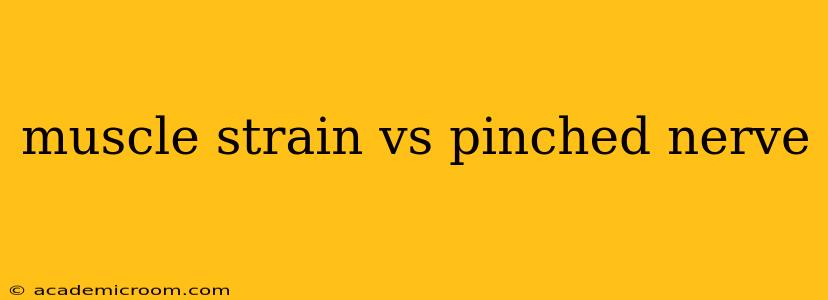Experiencing pain in your back, neck, or limbs can be incredibly debilitating, leaving you wondering what's causing the discomfort. Two common culprits are muscle strains and pinched nerves, conditions that share some similar symptoms but have distinct underlying causes and treatments. This comprehensive guide will delve into the key differences between muscle strains and pinched nerves, helping you better understand your condition and seek appropriate medical attention.
What is a Muscle Strain?
A muscle strain, also known as a pulled muscle, occurs when muscles or tendons are overstretched or torn. This typically happens due to sudden movements, overuse, or repetitive strain. The severity of a muscle strain can range from mild discomfort to a significant tear requiring medical intervention.
Common Symptoms of a Muscle Strain:
- Pain: Pain is localized to the affected muscle and worsens with movement or use of the muscle.
- Tenderness: The affected area feels tender to the touch.
- Swelling: Inflammation may cause swelling around the injured muscle.
- Muscle spasms: Involuntary muscle contractions can occur.
- Limited range of motion: Difficulty moving the affected area is common.
- Bruising: In more severe cases, bruising may be present.
What is a Pinched Nerve?
A pinched nerve, or nerve compression, occurs when pressure is placed on a nerve, disrupting its normal function. This pressure can stem from various sources, including bone spurs, herniated discs, inflammation, or tumors. The location of the pinched nerve dictates the symptoms experienced.
Common Symptoms of a Pinched Nerve:
- Pain: Pain can be sharp, shooting, burning, or aching, often radiating along the nerve's pathway. This is known as radiculopathy.
- Numbness: A loss of sensation in the area supplied by the affected nerve.
- Tingling: A pins-and-needles sensation.
- Weakness: Muscle weakness or atrophy in the affected area.
- Limited range of motion: Difficulty moving the affected area due to pain or weakness.
Muscle Strain vs. Pinched Nerve: Key Differences
While both conditions can cause pain and limit movement, several key distinctions exist:
| Feature | Muscle Strain | Pinched Nerve |
|---|---|---|
| Cause | Overstretching or tearing of muscles/tendons | Pressure on a nerve from various sources |
| Pain Location | Localized to the affected muscle | Radiates along the nerve's pathway (radiculopathy) |
| Pain Quality | Aching, soreness, cramping | Sharp, shooting, burning, tingling, or aching |
| Numbness/Tingling | Usually absent | Often present |
| Weakness | May be present, but usually less severe | Often more pronounced |
How Are Muscle Strains and Pinched Nerves Diagnosed?
Diagnosing muscle strains and pinched nerves typically involves a physical examination by a healthcare professional. They will assess your symptoms, medical history, and conduct a thorough physical exam to evaluate your range of motion, strength, and reflexes. Imaging tests like X-rays, MRI scans, or CT scans might be necessary to confirm the diagnosis and rule out other conditions, particularly in cases of pinched nerves.
What is the treatment for a muscle strain?
Treatment for a muscle strain usually involves rest, ice, compression, and elevation (RICE). Over-the-counter pain relievers like ibuprofen or naproxen can help manage pain and inflammation. Physical therapy may be recommended to improve flexibility and strength.
What is the treatment for a pinched nerve?
Treatment for a pinched nerve depends on the underlying cause and severity of the condition. Options may include:
- Rest and conservative measures: Similar to muscle strains, rest, ice, and over-the-counter pain relievers may be helpful.
- Physical therapy: Exercises and stretches can help improve flexibility, strengthen muscles, and reduce nerve pressure.
- Medications: Prescription medications, such as muscle relaxants or stronger pain relievers, may be necessary. In some cases, corticosteroids may be injected near the nerve to reduce inflammation.
- Surgery: In severe cases that don't respond to conservative treatments, surgery may be required to alleviate pressure on the nerve.
Can a Muscle Strain Cause a Pinched Nerve?
While not directly causing a pinched nerve, severe muscle spasms from a significant muscle strain can, in some instances, indirectly contribute to nerve compression by altering the surrounding anatomy. This is less common but a possibility.
How long does it take for a muscle strain to heal?
Healing time for a muscle strain varies depending on its severity. Minor strains may heal within a few days to weeks, while more severe strains can take several weeks or months to fully recover.
How long does it take for a pinched nerve to heal?
Healing time for a pinched nerve is also variable and depends on the cause and severity. Some cases may resolve with conservative treatment in a few weeks, while others may require ongoing management or surgery, resulting in a longer recovery period.
This information is for general knowledge and does not constitute medical advice. Always consult a healthcare professional for diagnosis and treatment of any medical condition.
